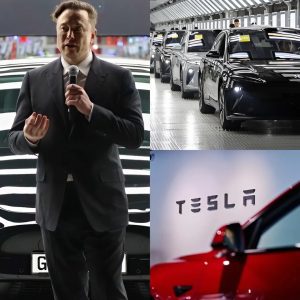Tesla’s Market Meltdown: $800 Billion Wiped Out Amid Growing Investor Backlash
Tesla, once the undisputed leader in electric vehicles and a favorite on Wall Street, is now facing one of the most dramatic market collapses in modern corporate history. Over the past four months, the company has lost an astonishing $800 billion in market value, sparking alarm among board members and investors alike.
The financial freefall has intensified calls for CEO Elon Musk to be held accountable. Critics argue that Musk’s increasingly high-profile political ventures have significantly damaged the company’s image and investor confidence. Never before has a tech titan’s entanglement in political controversy had such a profound and immediate impact on market performance.

Tesla at a Crossroads: Musk’s Political Ambitions and Strategic Drift Rattle Investors
Tesla, long hailed as the pioneer of the electric vehicle revolution, is now navigating one of the most dramatic downturns in corporate history. In just four months, the company has lost nearly $800 billion in market capitalization—an unprecedented collapse that has rattled investors and sparked open dissent within the boardroom. At the center of the storm: CEO Elon Musk, whose deepening entanglement with national politics is drawing fierce scrutiny.
Musk’s dual fixation on political influence and personal legacy has cast a long shadow over Tesla’s future. Once riding high on market optimism and bold innovation, the company is now facing serious questions about the sustainability of its valuation, product strategy, and consumer trust. The slide began after Tesla stock peaked in December 2024. But by April 2025, when the company released a dismal first-quarter earnings report, it became clear the momentum had reversed: profits were falling, sales were slumping, and investor confidence was rapidly eroding.
Musk, who has lost an estimated $100 billion in net worth during the downturn, remains a polarizing figure. His leadership is now the subject of fierce debate among Tesla’s board members, some of whom are openly questioning his priorities. Central to the controversy is Musk’s role as head of the newly formed Department of Government Efficiency (DOGE) under President Donald Trump’s administration. Despite promising to scale back his involvement in politics, Musk has admitted he still plans to spend “one or two days per week” on government affairs—a level of distraction that many view as unacceptable for the CEO of a struggling global automaker.
Initially, some investors tolerated Musk’s political overtures, hoping they might lead to regulatory benefits for autonomous vehicles or green tech. But those hopes have faded. Despite minor relaxations in self-driving regulations, the administration’s broader hostility toward electric vehicles and its ongoing trade war have continued to damage Tesla’s competitiveness—especially in global markets.
Consumer backlash has also intensified. The DOGE initiative has triggered protests and boycotts at Tesla showrooms nationwide, further eroding the brand’s reputation. For many, Musk’s alignment with MAGA politics has become a liability, not an asset.
But Tesla’s problems are not solely political. Underlying business fundamentals have weakened in alarming ways. Global EV sales dipped in 2024, and a growing portion of Tesla’s revenue now comes not from car sales but from carbon credit trading—a concerning shift for a company built on innovation. The product lineup has stagnated. Promised affordable models remain elusive, while Chinese rivals like BYD race ahead with superior pricing, faster innovation, and more advanced autonomous tech.
Tesla’s much-publicized Full Self-Driving rollout in China earlier this year was met with widespread indifference. Local consumers, faced with strong domestic options, showed little interest. This lukewarm reception has only heightened concerns that Tesla’s technological edge is slipping. Meanwhile, Musk appears increasingly focused on side ventures—whether social media platform X, AI debates, or political sparring—rather than rethinking Tesla’s strategy or reinvigorating its product pipeline.
Privately, some investors worry Musk is simply losing interest in running a car company. Instead, they see him chasing the thrill of geopolitical influence and grand ideological battles. Still, Tesla has pressed ahead with new plans, reaffirming a June production start for lower-cost vehicles and teasing the launch of an autonomous taxi service in Austin. Musk remains publicly bullish, recently claiming Tesla is on track to become “the most valuable company in history,” powered by a fleet of robotaxis and humanoid robots dubbed Optimus.
But such sweeping visions are no longer enough to reassure a shaken market. With its valuation halved, sales falling, and public trust fraying, Tesla’s long-term outlook appears increasingly fragile. Even now, its stock trades far above traditional metrics—a reflection not of financial fundamentals, but of enduring faith in Musk’s personal brand. If Tesla were valued like a conventional automaker, the disparity between myth and reality would be laid bare.
For many, Tesla is no longer a company—it’s a speculative instrument tethered to the charisma of a single man. And that tether is wearing thin.
Pressure is mounting for Musk to either recommit fully to his role or step aside in favor of a leader focused on the company’s day-to-day demands. Some board members argue it’s time for Tesla to adopt a more conventional corporate structure, emphasizing stability over spectacle. Earlier this year, a Delaware court ruling scrutinized Musk’s $55 billion pay package and highlighted troubling governance issues, including close personal ties between Musk and several directors—a red flag for shareholders.
This is no longer just about financial loss. It’s about leadership, accountability, and the trajectory of a company once seen as the future of transportation. Musk’s accomplishments are undeniable. He’s already earned his place in the annals of business history. But legacy cannot steer a company through crisis. That requires discipline, strategic focus, and undivided attention—traits increasingly absent from Musk’s leadership.
Ultimately, the question is no longer whether Musk is capable of greatness. It’s whether he’s still committed to leading Tesla. If not, the road ahead may belong to someone else—someone ready to keep both hands on the wheel and eyes fixed firmly on the future.



